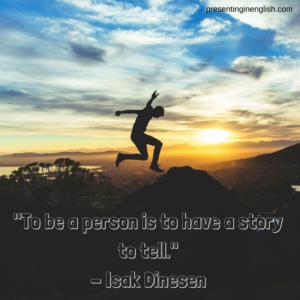
One of the best types of supporting material you can put in a speech are stories. Storytelling is deeply rooted in human nature. The tradition of oral storytelling began long before human knew how to write. It was a way of passing on history and teaching a new generation. Anthropologists have found folk tales and stories in some of the earliest examples of human writing in Sanskrit, Latin, Greek, Chinese and Egyptian.
“To be a person is to have a story to tell.” – Isak Dinesen
Why are stories so effective? There are many scientific studies that have tried to answer this question, this article in the Harvard Business Review summarises some of the most important ones. Some suggest it is because we are social beings and as we seek out explanations to understand our world, we create stories. Other studies prove that we are more open to new ideas when they are presented in a story format than when they are presented as facts. You see this with modern TV advertisements that include mini-stories with realistic characters.
Here are some reasons why stories are a particularly good tool for ESL speakers to use:
- Because stories are almost always told in colloquial and informal way, the vocabulary is simpler. You can stick to using words that you are comfortable with and that are easy to pronounce. The simple language also makes it easier for the audience to follow, even if your accent is strong.
- You can rely on body language, emotions and your voice to help you connect with your audience rather than just words. Don’t be afraid of exaggerating your body language a little bit during your story, it will help the audience visualise it better.
- Stories are often personal and so they are easier to remember than numbers and facts. This can save you time when you are practising and probably will mean you won’t have to memorise your presentation word for word.
- You also may have had some unique experiences that native English speakers would be interested in hearing about or a unique perspective that is new to your audience. Don’t underestimate the power of stories that come from places the audience has never been to.
- Your stories don’t have to be deep and profound. I’ve told stories in my speeches about getting a massage, being in a business meeting, family visiting and learning a new language. What counts is that your story supports your key message.
If you want to get some inspiration from storytellers head over to www.themoth.org Here you can listen to professional and amateur storytellers share true stories.
In the meantime, I will leave you with a visual representation of how useful stories can be – especially in difficult circumstances.
